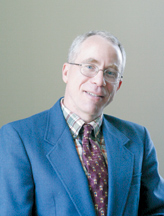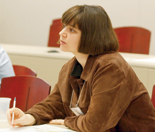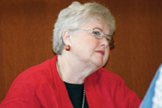WM asked Wabash faculty and staff members to recall their own summer teachable moments.
During the summer between my junior and senior years of college, I took a mathematics class that had a travel component—seven countries in 31 days. One of the places we visited was Mycenae in Greece. There was another group of students there, who raced up the hill, pointed at the Lion’s Gate, and raced back down. In contrast, our group had spent time preparing for our visit, and we had a much richer experience: we found the circular grave structure that resembles Stonehenge, the deep cistern, the huge water jars, and many other details that the other group totally missed.
This experience confirmed for me that knowledge and preparation do not destroy beauty, but allow you to experience it more fully.
Assistant Professor of Chemistry Ann Taylor
 | |
|
Frederik Ohles
|
Last June and July, I worked feverishly on the final draft of my Ph.D. dissertation, often delirious with stress and exhaustion. Yet I have vivid memories of breaks: catching a rest on the sweet grass in the comforting sun; running around campus with my two- and four-year-old kids; pacing the University of Washington quad at night, studying its beauties; doing pull-ups at the ROTC proving grounds to get a burst of energy in the night’s wee hours and fresh air; sunrises of despair on deadline days, gutting it out anyway and meeting the deadlines—victory after victory following difficulty after difficulty.
I turned in the final draft just under the wire, three days before I drove out here to Wabash—a magical, exhilarating feeling of achievement. Work makes life sweet, indeed.
Visiting Instructor Patrick Myers
Lilly Teaching Fellow in the
Classics Department
 | |
|
Joy Castro
|
Last summer, I spent a week at the Provincetown Fine Arts Work Center learning how to make handmade books from Peter Madden, an artist who teaches at the Boston Museum of Fine Arts. Provincetown—a beautiful beach town that has long been a haven for artists, queers, and other outsiders—was a wonderful education in itself, but I spent most of my nights and days in the workshop lab, which was open 24/7.
As a little kid, I used to write and illustrate books on sheets of paper torn from memo pads, stapling them together to make “books.” In Provincetown, I used handmade paper from India, silk, leather, cardboard coffee-cup holders, chopsticks, tunafish cans, and waxed thread to interpret in visual forms some of the stories I’ve published. It was every bit as much fun as the memo pads.
When I get back from sabbatical, I’ll be teaching the skills I learned in advanced creative writing courses at Wabash. Many thanks for the John J. Coss Faculty Development Funds that made it possible.
Associate Professor of English Joy Castro
 | |
|
Nancy Doemel
|